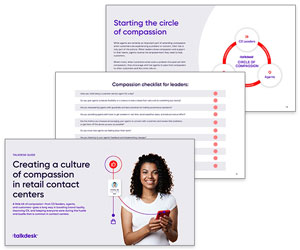Here Caroline Hardwicke shares her thoughts with us around the importance of developing empathy in the call centre.For the last 16 years I’ve worked in or with contact centres. I’ve taken calls, supervised, managed, trained, consulted and puzzled over how to operate every coffee vending machine. I’ve seen and experienced what works well and learned from blunders (mostly mine). The most significant part of my learning curve has been the importance of the link between customer experience and how employees who interact with customers are treated.
The call centre manager who values, respects, motivates, and empathises with every member of their team will reap an abundance of delighted customers.
Spend time with people
I worked in one large organisation where the Managing Director would regularly spend time in the call centre, getting to know the advisors, sitting with them, empathising with them and offering support. His philosophy was that the success of the business depended on understanding and meeting customer needs.
To do this well, he believed he needed to regularly spend time with “the most important employees in our organisation – the people who communicate with our customers”. He encouraged the rest of the senior management team to do the same and many of their strategic decisions evolved from conversations they’d had with the staff on the front-line.
Business boomed under his leadership – he was an inspiration to everyone he worked with and highly respected.
It’s not rocket science
What he did wasn’t rocket science – it was simple – he valued people, spent time with them and rated their opinions. If anyone questioned his approach he would say – “Knowledge talks, wisdom listens”.
Empathy is all about standing in someone else’s shoes, putting aside our own ego and trying to see, understand and respect the other person’s perspective. It is the first part of achieving a connection with someone and vital if we want to build rapport.
Improve empathy with your team
To improve empathy with customers the first step is to improve empathy with the people who deal directly with those customers. If our call centre teams feel that no one is particularly interested in their day-to-day challenges or their ideas, this has an impact on how they communicate with customers.
There are two key components that happen in an empathetic interaction with a customer – Attitude and Understanding.
Attitude – the behaviours listed below form the backbone of an excellent contact centre manager or advisor, they are the foundation upon which effective communication is built:
- Interested in others
- Desire to do a good job
- Taking personal responsibility
- Positive can-do mindset
- Energy and enthusiasm
- Warmth and kindness
- Openness and honesty
Understanding – the skills and behaviours needed for an empathetic approach:
- Putting oneself in the other person’s position
- Personalised questioning to understand need
- Active listening
- Appreciating the needs of the individual
Contact centre advisors react positively to being valued, respected and listened to but this is only one part of creating successful customer interactions. Another influencing factor is how we measure and coach individual performance. People respond to targets, especially if those targets are linked to financial gain or loss. If, as a manager, you are not happy with your customer experience – ask yourself what you are measuring and how you are coaching. If the focus is on quantitative measures (e.g. average handling time) rather than qualitative measures – like the ones listed above – therein lies your answer.
Specify the behaviours
If you want advisors to demonstrate empathy in their interactions with customers, provide them with quality measures that have clearly defined skills and behaviours. We often make the mistake of defining the skill we’re looking for but omit the useful detail of how to achieve it. For example ‘Build rapport with customer’ states the desired outcome but doesn’t tell us what we need to do. It can be more helpful to specify the behaviours that enable us to build rapport – such as matching the customer’s style, tone and pace – being flexible, interested and responsive.
Encourage team leaders
Finally, encourage team leaders to coach their team empathetically. Ideally they should be allowing advisors to take ownership of their performance, assess themselves and set their own development goals. An excellent coach facilitates development by asking questions – they avoid telling the coachee what to do.
Customers won’t always remember what you said – but they will remember how you made them feel. Empathy works!
Caroline Hardwicke is Senior Consultant, Harding & Yorke Empathy Academy
Author: Jo Robinson

















im starting my own call centre training close corporation, to improve current call centre agents score and productivity of the company as a whole. your suggestions would highly be appreciated. thank you
At Alivox we have been promoting the use of empathy between caller and agent by matching their Accents during inbound call routing.
I agree totally with the key points of this article.
We work with many companies to assess the quality of their customer experience.
Rapport and empathy are almost always the areas that cause most difficulty, and we’ve done a lot of work to drill down into observable behaviours around them.
But at the end of the day agents need to see models and examples, and be inspired to follow them.